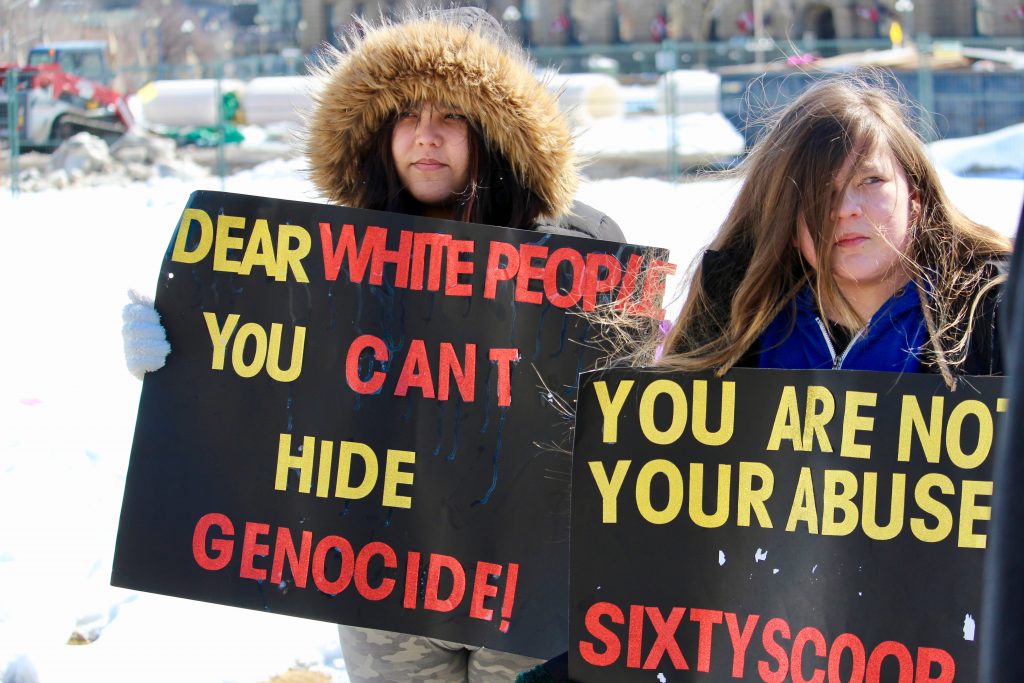Sixties Scoop survivors continue to call for healing as federal settlement approaches
By Sophia Barkhouse
As Sixties Scoop survivors wait for approval of a federal government settlement that would compensate them for being taken away from their families as young children, activists are emphasizing collaboration amongst survivors to continue their path towards healing.
Starting in the 1960s, the Canadian government removed thousands of indigenous children from their biological families and placed them with non-indigenous parents. The total number of children involved is unclear, but it is estimated there are between 15,000 and 30,000 survivors.
As compensation, the government is proposing a monetary settlement for survivors. Final hearings on the settlement will be held on May 30 in Toronto.
Since a National 60’s Scoop Survivor Solidarity Rally on March 16, which included a demonstration on Parliament Hill, survivors have been looking to advance their cause.
Colleen Cardinal, a Sixties Scoop survivor, has been advocating for survivor rights for years. She is a member of the National Indigenous Survivors of Child Welfare Network and was a co-organizer of the national rally.
“We’ve always maintained that healing is paramount for us, and building communities for other Sixties Scoop survivors so they know there’s other adoptees out there looking out for them, and that we are doing that work here in Ottawa,” she said.
There had been no gathering of this kind in the Ottawa area before, prompting Cardinal and fellow survivors to organize their own.
The rally was held in front of Parliament to bring more national attention to the politics of the situation.
She said downtown Ottawa is an important place for bringing together survivors, with its housing and service options. Indigenous people across the city frequently come to Centretown to use numerous resources, including the Odawa Native Friendship Centre.
Originally, Cardinal was against the proposed financial settlement for survivors. With more information being released, Cardinal has now accepted it and focuses on working with survivors.
Cardinal said her organization needs to “meet people where they’re at, ask people what they need and make sure they have a voice on what’s happening, and then continue to amplify their voices at a larger level.”
Angela Ashawasegai is another outspoken survivor. Ashawasegai founded the Sixties Scoop Awareness organization and said she hopes the settlement is accepted.
She says it will allow survivors to continue the healing process.
“I’m completely relieved that Canada has woken up and is going to reconcile with Sixties Scoop survivors and what the government had done to us,” she said. “They are righting the wrong and I’m good with it. I’m good with it because I’ve waited a long time for this.”
To Ashawasegai, education is the key to reconciliation. She teaches Canadians about the Sixties Scoop through her organization.
“What I wanted is to help other people discover their healing path and to be able to overcome colonial trauma,” she said.
Ashawasegai is passionate about advocating for survivors on the subject of the Sixties Scoop. She is looking forward to joining the Healing Foundation, should the settlement be approved.
Edith Pedneault, an official with the federal ministry of Indigenous and Northern Affairs Canada, said the government is committed to finding a resolution for survivors.
“Implementing this proposed settlement is a significant step toward recognizing harm done and bringing a meaningful resolution to the painful legacy of the Sixties Scoop,” she said via email.
But she also said that for many this is just the first step.
“The Government of Canada is aware that there are other Sixties Scoop claims that remain unresolved, including those of Métis and Non-Status Indians, and will continue to work with all those affected by this regrettable chapter in Canadian history.”
Going forward, Cardinal and Ashawasegai say survivors should band together in their efforts.
“We all need to work together to build a bridge to understand each other, to understand the history of the Sixties Scoop,” said Ashawasegai. “We need to continue moving forward with conversations about what the Sixties Scoop was about and how we can repair and rebuild our relationship with Canada.”
Cardinal said her organization will keep trying to make progress by building specific programs for survivors, such as health and counselling services.

